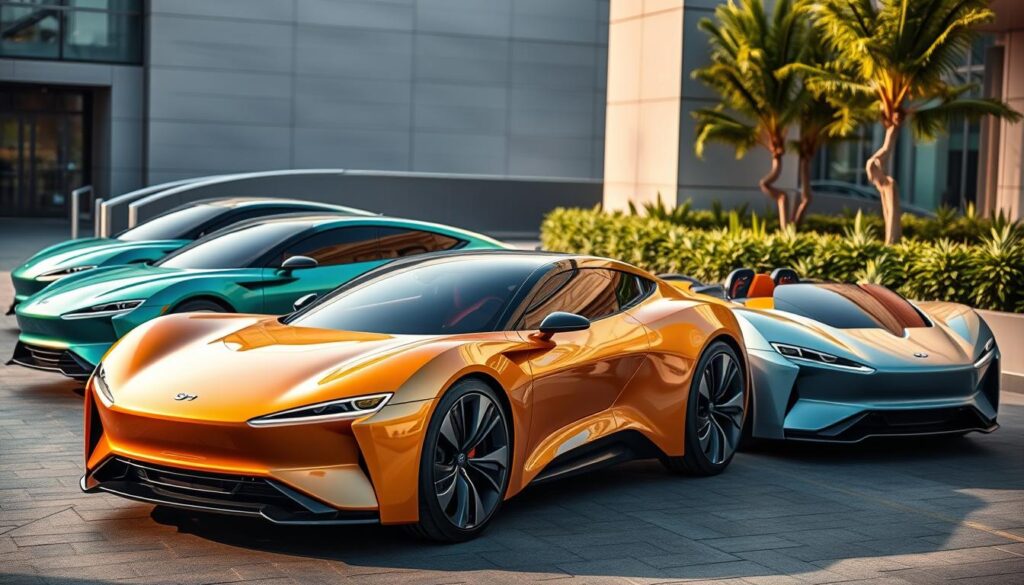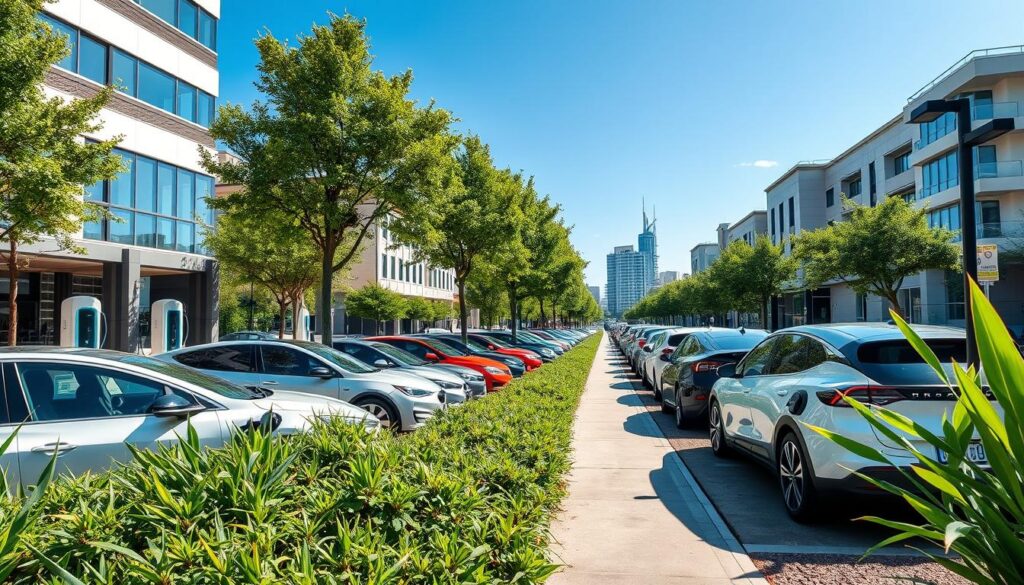The Indian car market is about to change a lot with electric vehicles (EVs). By 2025, 36 new electric cars will hit the roads. These cars will range from luxury to affordable options, making eco-friendly travel easier for everyone.
Most of these cars, 27, will be SUVs. There will also be 5 hatchbacks, 2 sedans, 2 coupes, 2 convertibles, 2 MUVs, and 1 pickup truck. In fact, 13 of these cars will arrive in the next three months. Prices will vary from ₹5 Lakh to ₹3.5 Crore, fitting many budgets.
Key Takeaways
- India is set to witness the launch of 36 upcoming electric cars between 2024-2026
- The majority of the upcoming EVs will be SUVs, accounting for 27 out of the 36 models
- The price range for these upcoming electric cars is expected to be between ₹5 Lakh to ₹3.5 Crore
- 13 of the 36 upcoming electric cars are expected to launch within the next three months
- The Indian EV market is experiencing rapid growth and diversification, catering to a wide range of consumer preferences
The Evolution of Electric Vehicles in India
The Indian auto industry has seen a big change in electric vehicles (EVs). Companies are making cars that fit India’s needs, focusing on sustainable mobility and automotive innovation. This change comes from government support, more people knowing about EVs, and better battery tech.
New EV models are coming with better range and power. For example, the Mahindra XUV 3XO EV will go about 500 km and cost between ₹14-19 lakhs (ex-showroom). The Maruti Suzuki eVX will have a 60 kWh battery, go over 550 km, and cost between ₹12-18 lakhs (ex-showroom).
There’s also a move towards luxury EVs. Brands like Mercedes-Benz, Land Rover, and Audi are bringing their electric models. They aim to meet the growing need for eco-friendly, high-end cars.
“The Indian EV market is poised for exponential growth, with manufacturers continuously innovating to meet the evolving needs of consumers. The future of sustainable transportation in India looks increasingly electric.”
The Indian auto industry is fully embracing the sustainable mobility shift. We can expect to see more automotive innovation and a variety of EVs for all budgets and needs.
Current State of EV Market and Future Projections
The Indian electric vehicle (EV) market is growing fast. It’s set to lead the clean mobility revolution globally. The market is expected to grow from US$ 3.21 billion in 2022 to US$ 113.99 billion by 2029. This shows a CAGR of 66.52%.
Market Growth Statistics
The Indian EV market is expected to see a big increase in sales. This is due to government incentives, more charging stations, and growing awareness among consumers. Key insights include:
- The Indian EV battery market is expected to grow from US$ 16.77 billion in 2023 to US$ 27.70 billion by 2028.
- Tata Motors plans to invest around Rs. 18,000 crore (US$ 2.16 billion) to boost its EV ecosystem. It aims for 30-40% of its sales to come from EVs by Fiscal Year 2030.
- Ather Energy, a leading EV startup, recently got a US$ 19.25 million (Rs. 160 crore) investment. This will help it grow and expand its operations.
- Gujarat saw a 28% increase in EV sales in 2023, with 88,619 vehicles sold. This is a 714% growth over three years.
Government Initiatives and Support
The Indian government is pushing for more electric vehicles through policies and incentives. These efforts aim to make mobility sustainable and reduce carbon emissions. Key initiatives include:
- The FAME II scheme offers subsidies and incentives for buying electric vehicles.
- Exemption of customs duty on lithium-ion battery manufacturing equipment to encourage local production.
- The Electric Mobility Promotion scheme, with a budget of US$ 60.18 million (Rs. 500 crore), aims to boost EV manufacturing and green mobility.
- The goal is to achieve 30% electric mobility by 2030, supported by various policy measures and regulatory frameworks.
Infrastructure Development
Expanding charging infrastructure is key for electric vehicles to become common in India. The government is working to set up a wide network of charging stations. This will make charging EVs easy and convenient.
Initiatives to promote public and private charging stations are underway. Private players are also joining in. This will make charging infrastructure more accessible, driving the EV market growth in India.
Top 10 Upcoming EV Cars in India in 2025
The Indian electric vehicle (EV) market is getting ready for a thrilling lineup. We will see many EV models by 2025. These include electric SUVs and luxury electric cars that will grab everyone’s attention.
- Mahindra XUV.e8 (₹35-40 lakhs)
- Maruti Suzuki EVX (₹25-30 lakhs)
- Renault Megane E-Tech (₹20-25 lakhs)
- Kia EV9 (₹55-60 lakhs)
- Volkswagen ID.4 (₹35-40 Lakhs)
- BYD Seal (₹40-45 lakhs)
- Nissan Ariya (₹50-55 lakhs)
- MG Marvel R (₹50-55 lakhs)
- Tata Avinya (₹30-35 lakh)
- Hyundai Ioniq 6 (₹50-55 lakh)
These new EV models come with different features, battery sizes, and prices. They cater to various tastes and needs of Indian buyers. This range shows how fast the Indian EV market is growing.
“The upcoming EV models in India are set to revolutionize the way we think about transportation, offering a sustainable and technologically advanced alternative to traditional vehicles.”
These new EV models aim to improve driving, battery life, and tech. They are set to change the future of driving in India. As India goes green, these electric SUVs and luxury electric cars will be key players in the auto industry.
Luxury EV Segment: Premium Offerings
The luxury electric vehicle (EV) segment in India is set for a big change soon. As more people want high-end, fast EVs, famous car brands are bringing out new models. These cars will meet the high standards of the Indian market. Let’s explore some of the most awaited luxury electric cars coming by 2025.
Mercedes-Benz EQG: The Pinnacle of Luxury and Capability
The Mercedes-Benz EQG is at the top of the list, launching on June 15, 2025. It’s expected to cost around ₹3.50 Cr. This luxury SUV will go up to 700 km on one charge and hit 200 kmph. It’s a strong contender in the luxury electric vehicles market.
Land Rover Range Rover Electric: Redefining Luxury and Sustainability
The Land Rover Range Rover Electric is another highlight, launching on May 15, 2025. It will cost around ₹3 Cr. This electric version of the classic Range Rover combines luxury, power, and green tech.
Audi Q6 e-tron: Elegance and Performance in Perfect Harmony
The Audi Q6 e-tron is also joining the luxury EV scene, set for release on March 15, 2025. It’s expected to cost ₹1 Cr. This electric SUV from Audi will have cutting-edge tech, like ADAS and ProPILOT 2.0, and a range of up to 600 km.
These top-tier luxury electric vehicles are changing the Indian EV scene. They offer luxury, speed, and green living. With their advanced tech, great performance, and fine craftsmanship, these premium EV brands will win over Indian buyers.

Mid-Range Electric SUVs and Crossovers
The mid-range electric SUV and crossover segment is booming in India. Several new models are coming soon. These cars offer great performance, range, and features at prices that are easier to reach.
The Kia EV5 is expected to cost around ₹55 lakh. The Kia Seltos EV will likely be priced at ₹20 lakh. The Volkswagen ID.7, a crossover EV, is expected to cost about ₹70 lakh.
These cars are perfect for families who want electric vehicles. They offer space, modern amenities, and good driving ranges. As more people choose electric cars in India, these models will help make the switch easier for everyone.
| Model | Estimated Price (ex-showroom) | Segment |
|---|---|---|
| Kia EV5 | ₹55 Lakh | Electric SUV |
| Kia Seltos EV | ₹20 Lakh | Electric SUV |
| Volkswagen ID.7 | ₹70 Lakh | Electric Crossover |
These mid-range electric SUVs and crossovers are key to growing electric vehicle adoption in India. They offer a practical and affordable choice for families and city commuters. As the market grows, we can expect more electric options in this segment to meet different tastes and budgets.
Budget-Friendly Electric Options
The electric vehicle (EV) market in India is growing fast. More affordable and budget-friendly options are coming out. These entry-level electric vehicles are making electric cars more accessible. They offer useful features and enough range for city driving.
Renault Kwid EV (₹5 Lakh)
The Renault Kwid EV is a highly anticipated budget EV in India, priced at around ₹5 Lakh. It’s set to launch on January 15, 2025. This compact electric car is a cost-effective choice for eco-friendly city commuters.
BYD Seagull (₹10 Lakh)
The BYD Seagull is another affordable electric car coming to India, priced at ₹10 Lakh. It’s scheduled to launch on January 31, 2025. The Seagull aims to offer a mix of features and affordability for budget EV buyers.
Maruti WagonR Electric (₹8.50 Lakh)
The Maruti WagonR Electric is priced at about ₹8.50 Lakh. It’s set to launch on January 15, 2026. This model from India’s top automaker is expected to meet the needs of affordable EV fans.
These budget-friendly electric cars are expanding electric mobility in India. They offer practical features, enough range, and good prices. These models are set to increase the adoption of affordable electric vehicles in the country.
| Model | Price (ex-showroom) | Range (km) | Battery Capacity (kWh) |
|---|---|---|---|
| Renault Kwid EV | ₹5 Lakh | 180 km | 21.3 kWh |
| BYD Seagull | ₹10 Lakh | 300 km | 31.9 kWh |
| Maruti WagonR Electric | ₹8.50 Lakh | 250 km | 27.7 kWh |
These budget EVs aim to make electric cars more accessible. They offer useful features and enough range for city driving.

Battery Technology and Charging Capabilities
The growth in EV battery technology has boosted the performance and range of new electric cars in India. Many new EVs come with big lithium-ion batteries. These batteries hold more energy, letting cars go further on one charge.
The BYD Seal is set to have a range of 700 km on one charge. The Tata Avinya can charge to 100 km in just 10 minutes. These big steps in battery capacity are changing the EV scene. They make electric cars more useful and easy to use for people in India.
Fast-charging stations are also growing in India. This makes it quicker to charge EVs. It’s now easier for people to drive long distances in electric cars.
| Upcoming EV Model | Range (km) | Fast Charging Time |
|---|---|---|
| BYD Seal | 700 | 100 km in 10 minutes |
| Tata Avinya | 600 | 100 km in 10 minutes |
| Mahindra XUV.e8 | 550 | 80 km in 10 minutes |
| Ola Electric Sedan | 500 | 120 km in 10 minutes |
| Volkswagen ID.4 | 480 | 100 km in 15 minutes |
As the Indian EV market grows, these improvements in EV battery technology and fast charging are changing how we drive. They make electric cars more practical and attractive to more people.
Performance Specifications and Range Analysis
The upcoming electric vehicles (EVs) in India come with different performance levels. Battery sizes range from 17.3 kWh for budget options to 77.4 kWh for premium models. This affects the EV range, with the lowest at 230 km and the highest at 708 km.
Battery Capacity Comparison
Entry-level EVs, like the Renault Kwid EV, have smaller batteries. The Maruti Suzuki eVX offers 48 kWh and 60 kWh options. The BYD Seal has a 77.4 kWh battery for those who want the longest range.
Charging Time Analysis
Charging times have gotten better, with fast-charging capabilities in many models. Some can charge up to 80% in 30 to 60 minutes. For example, the MG Cloud EV has a 50.6 kWh battery and a range over 505 km. The MG Yep Plus has a 41.9 kWh battery and a range of 401 km.
Range Per Charge Details
The range per charge varies among EV models. The Hyundai Ioniq 6 has a range of about 600 km. Budget options like the BYD Seagull offer around 230 km. There’s a wide range of EVs, from 300 km to over 700 km, to meet different needs.
FAQ
What are the top 10 upcoming electric vehicles (EVs) in India for 2025?
The top 10 EVs in India for 2025 include the Mahindra XUV.e8 and Maruti Suzuki EVX. Also, the Renault Megane E-Tech and Kia EV9 are on the list. The Volkswagen ID.4, BYD Seal, and Nissan Ariya are also coming. MG Marvel R, Tata Avinya, and Hyundai Ioniq 6 round out the list. These cars range from ₹5 Lakh to ₹3.50 Cr, covering SUVs, hatchbacks, sedans, and crossovers.
What is the growth outlook for the Indian EV market?
The Indian EV market is expected to grow a lot. Between 2024-2026, 36 electric cars will hit the market. Government support, growing awareness, and better battery tech are driving this growth.
What are the key government initiatives and infrastructure developments supporting the EV market in India?
The government is offering incentives and subsidies to boost EV adoption. This includes tax benefits and investing in charging networks. These efforts, along with more charging spots, are helping the EV market grow.
What are the latest advancements in battery technology and charging capabilities for upcoming EV models?
New EVs have advanced lithium-ion batteries with more energy and faster charging. Many can go over 600 km on one charge. They also support fast charging, filling up to 80% in 30-60 minutes.
How do the performance specifications and range vary across the different EV segments in India?
EVs in India have a wide range of specs. Battery sizes range from 30 kWh to over 100 kWh. This means ranges from 300 km to over 700 km. Charging times have also improved, with fast charging options available.










